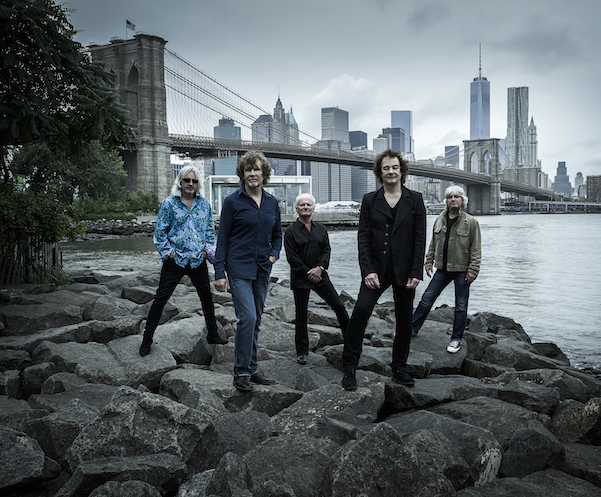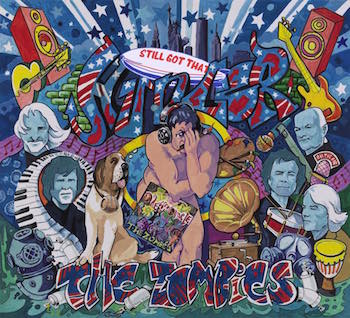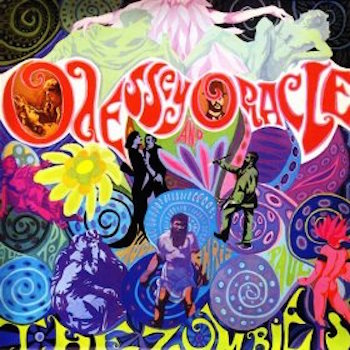Rock Interview: Rod Argent — Keeping the Zombies Alive
Rod Argent of the Zombies on the second incarnation of psychedelia.

The Zombies circa 2015. Photo: Andrew Eccles.
By Noah Schaffer
Over the past decade the Zombies have gone from being one of the lost greats of ’60s British psychedelia to a seemingly constant presence on the music scene.
Now co-leaders keyboardist Rod Argent and vocalist Colin Blunstone are back with the third studio LP of their second incarnation and their most ambitious tour to date. The US trek, which comes to the Wilbur on October 6, finds them playing their new material with the current lineup of the band and also recreating their 1968 masterpiece LP Odessey and Oracle in its entirety with original members bassist/co-songwriter Chris White and drummer Hugh Grundy.
Recently the Arts Fuse talked to Argent from his UK home about their forthcoming LP Still Got That Hunger and the upcoming tour.
Arts Fuse: Why are you bringing two different rhythm sections on this tour?
Rod Argent: When Colin and myself got back together in 2000 it was by accident. I’d done a fundraising concert for jazz musician John Dankworth and Colin were in the audience. He got up on the spur of the moment and sang “Time of the Season” and “She’s Not There.” It sounded so nice we put together half a dozen gigs — and that’s all we intended to do. Then in a slow, gradual way we gathered momentum and formed this great new band and it started to become a permanent thing. When we first started to tour the US we just broke even, but we gradually built it up. And that’s the version that’s grown in tightness and commitment in this entirely unlooked for second incarnation. So the first half of the show will be played with the current incarnation. The second half, Odessey and Oracle from start to finish, will feature — besides Chris and Hugh — Darian Sahanaja, [the musical director of] the Brian Wilson Band, because we want to reproduce every note. He knows the album inside out. We wouldn’t have entertained doing it without him. Some of the tracks only work when you have every piece in place and he adds the occasional extra harmonies that enable us to get the full sound.

Cover art for the Zombies’ “Still Got That Hunger.”
AF: Are the two different rhythm sections very different to play with?
Argent: Not hugely. Obviously if you’re doing something like ”Hung Up On a Dream” or “Brief Candles” you’ll get a slightly more authentic reproduction of the bass or drum parts. All of the players have their own individual character. The new album has many resonances with the early stuff, so the combination is not awkward at all. A lot of the show’s unity comes from the fact that we made the new album the way we used to, with everybody playing in the same room at the same time.
AF: That doesn’t happen very often these days.
Argent: This was a very conscious decision. In my life I’ve been a reasonably successful producer of other artists, so I know all the ways of using modern technology to make records, which are great. But I really wanted to try and get that thing that happens when you’re all playing at the same time. Everyone moderates what they’re doing by listening to each other. I’m affected by the drummer and he’s affected by what I’m doing. We’re all affected by what Colin is doing and his singing is affected by what we’re doing. Our producer Chris Potter has produced for Verve and many other people and he now wants to make more albums this way. Originally the idea was just to get Colin on every track singing a guide vocal, but it turned out so well that those guide vocals became the master vocals. We still left some room for studio inspiration, but we tried to incorporate all the best qualities of what you get when you play music live.
AF: Were you trying to make a record that sounded like a ’60s Zombies record?
Argent: We weren’t trying to do anything. In the ’60s we’d never try to do what was fashionable or restrict our records to songs with quick hooks. We always took a musical idea, worked it through, and waited for something to happen for us. If it works for us and touches ourselves in some small way there’s more of a chance of the track reaching out and touching other people. And that’s exactly what we’re doing now. We’re using the same touchstones: we’re still trying to explore harmonies. We’re trying to be original. We’re trying to have areas of improvisation. So those things are still in there because those things excite us and are important to us
AF: Colin Blunstone’s voice has actually grown stronger as he’s gotten older. Do you write songs with his voice in mind?
Argent: It is stronger. As far as the writing goes, it’s not a conscious thing, it’s very much writing with the intent of exploring the idea of the song. Of course, Colin’s voice is in the back of my mind, but it’s more of an indirect subconscious thing, not a ‘he’ll sing this phrase well.’

Cover art of “Odessey and Oracle.”
AF: The new album features a re-recording of a ’60s Zombies tune, “I Want You Back Again.” Why re-record it?
Argent: One thing we discovered when we started to immerse ourselves more in Zombies material was that there was a whole raft of songs we’d never played live the first time around. We [initially] didn’t even think about ‘I Want You Back,’ but Tom Petty did a version on a live album and we heard it and loved it and we realized we’d never done that song on stage. We started playing it and really got to liking it. It’s now developed and matured a bit and enables me to stretch out on my solo a bit more.
AF: Moving to Odessey and Oracle, is it true that the album pretty much bombed when it came out?
Argent: My memory is it was well received critically but didn’t sell anywhere much, even though we ended up 18 months later getting a number one record (“Time of the Season”). But the LP wasn’t a big seller and the band had broken up. A few years ago I got a phone call from Chris White and he said it’s becoming a cult album with people, and I said to my wife I didn’t believe it. The first guy I talked to about it was Paul Weller, who is a massive star here in the UK. His group the Jam had 3 records in the top 5 and was the biggest thing on the punk-oriented platform, and he said his favorite LP of all time was Odessey and Oracle. I’m not a great punk fan, but I liked the Jam and Paul has never stopped singing the album’s praises. So from that point on there were succeeding waves of young people and bands embracing it. The Vaccines made a video about how it is their favorite album. It will never outsell The Dark Side of the Moon, but it provides a good income year in and year out. It sells more than it did when it was first released and had a hit song on it!
AF: If my math is correct the new incarnation of the Zombies has lasted longer and been at least as prolific as the original version.
Argent: We got together in 1961 and were semi-pro to ’64, then professional to ’67 when we broke up. We were together for 6 years. Now we have been going for 15 years and the band should be really tight. We’re playing for one reason: because it still feels energizing and exciting to create new material and have people accept it. That’s a real privilege at our age.
Over the past 15 years Noah Schaffer has written about otherwise unheralded musicians from the worlds of gospel, jazz, blues, Latin, African, reggae, Middle Eastern music, klezmer, polka and far beyond. He has won over ten awards from the New England Newspaper and Press Association.
